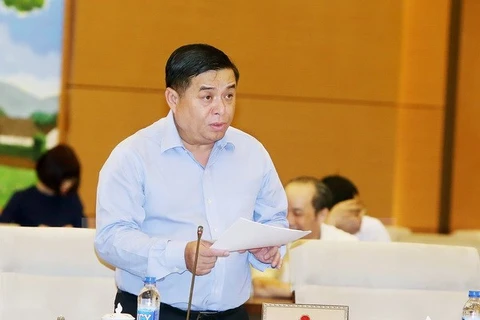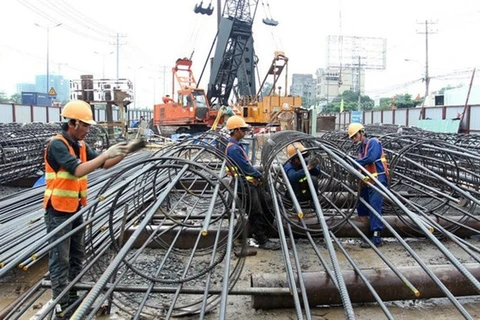Hanoi (VNA) - Prime Minister Nguyen Xuan Phuc on August 16 chaired the Cabinet’s regular meeting on the development of institutions. The discussion focused on the revised Law on Public Investment which amends and supplements a number of articles of laws relating to the Planning Law.
After hearing opinions and assessments on the amended Law on Public Investment, PM Phuc requested the Ministry of Planning and Investment (MPI) to study and take note of the feedback and suggestions from the various ministries, sectors, and Cabinet members to complete the draft.
He said that amendments of the law should be done with the key aim of decentralising and giving clearer authority to ministries, sectors, and localities – in particular defining what is the responsibility of chairpersons of provincial-level People's Committees and ministers.
It is necessary to promote the simplification of administrative procedures; create transparency and facilitation in allocating capital plan; and improve the efficiency of public investment management, he stressed.
The Government leader pointed out that the disbursement of public investment has remained slow in recent times due to cumbersome procedures.
The adjustment of the draft should purely focus on contents related to the budget capital management in investment, and investment projects using State budget abroad, he noted.
Regarding the concept of public investment sources, PM Phuc emphasised the need to have clear stipulations in order to ensure consistency with the Construction Law, the Bidding Law, the State Budget Law; as well as making the tasks of spending from and collecting to the State budget concerted.
He also asked for a clearer definition of the concept in terms of removing obstacles, empowering, and facilitating the implementation of public investment activities.
For the criteria and classification of State budget investment projects, the PM requested the MPI to report clearly on conditions to raise project criteria to the Government for considering and giving comments.
During the meeting, the PM asked the Ministry of Agriculture and Rural Development (MARD) to report on the response to Storm Bebinca, which is heading to the coastline from the northern Hai Phong city to the north-central Nghe An province.
He also urged the ministry to devise solutions to prevent and address risks in the rainy season.
Deputy Minister of MARD Hoang Manh Thang proposed that the PM help support the 5,886 households in 14 provinces across the country that lost their houses or were forced to evacuate to other areas due to the impact caused by serious floods, especially those in the northern mountainous provinces of Yen Bai, Son La, and Hoa Binh.
He asked for assistance worth over 880 billion VND (over 37.9 million USD) for the work, which he said would be provided directly to families in order to build housing and for localities to build infrastructure.
Applauding the ministry’s proposal, PM Phuc stressed the necessity to urgently support families that have been made homeless, asking the MARD to work with relevant ministries, sectors, and localities to examine accurately the number of families that need support.
The support resources should be taken from the State and local budgets, as well as those raised from the community and from donations of enterprises, he said.–VNA
After hearing opinions and assessments on the amended Law on Public Investment, PM Phuc requested the Ministry of Planning and Investment (MPI) to study and take note of the feedback and suggestions from the various ministries, sectors, and Cabinet members to complete the draft.
He said that amendments of the law should be done with the key aim of decentralising and giving clearer authority to ministries, sectors, and localities – in particular defining what is the responsibility of chairpersons of provincial-level People's Committees and ministers.
It is necessary to promote the simplification of administrative procedures; create transparency and facilitation in allocating capital plan; and improve the efficiency of public investment management, he stressed.
The Government leader pointed out that the disbursement of public investment has remained slow in recent times due to cumbersome procedures.
The adjustment of the draft should purely focus on contents related to the budget capital management in investment, and investment projects using State budget abroad, he noted.
Regarding the concept of public investment sources, PM Phuc emphasised the need to have clear stipulations in order to ensure consistency with the Construction Law, the Bidding Law, the State Budget Law; as well as making the tasks of spending from and collecting to the State budget concerted.
He also asked for a clearer definition of the concept in terms of removing obstacles, empowering, and facilitating the implementation of public investment activities.
For the criteria and classification of State budget investment projects, the PM requested the MPI to report clearly on conditions to raise project criteria to the Government for considering and giving comments.
During the meeting, the PM asked the Ministry of Agriculture and Rural Development (MARD) to report on the response to Storm Bebinca, which is heading to the coastline from the northern Hai Phong city to the north-central Nghe An province.
He also urged the ministry to devise solutions to prevent and address risks in the rainy season.
Deputy Minister of MARD Hoang Manh Thang proposed that the PM help support the 5,886 households in 14 provinces across the country that lost their houses or were forced to evacuate to other areas due to the impact caused by serious floods, especially those in the northern mountainous provinces of Yen Bai, Son La, and Hoa Binh.
He asked for assistance worth over 880 billion VND (over 37.9 million USD) for the work, which he said would be provided directly to families in order to build housing and for localities to build infrastructure.
Applauding the ministry’s proposal, PM Phuc stressed the necessity to urgently support families that have been made homeless, asking the MARD to work with relevant ministries, sectors, and localities to examine accurately the number of families that need support.
The support resources should be taken from the State and local budgets, as well as those raised from the community and from donations of enterprises, he said.–VNA
VNA
























